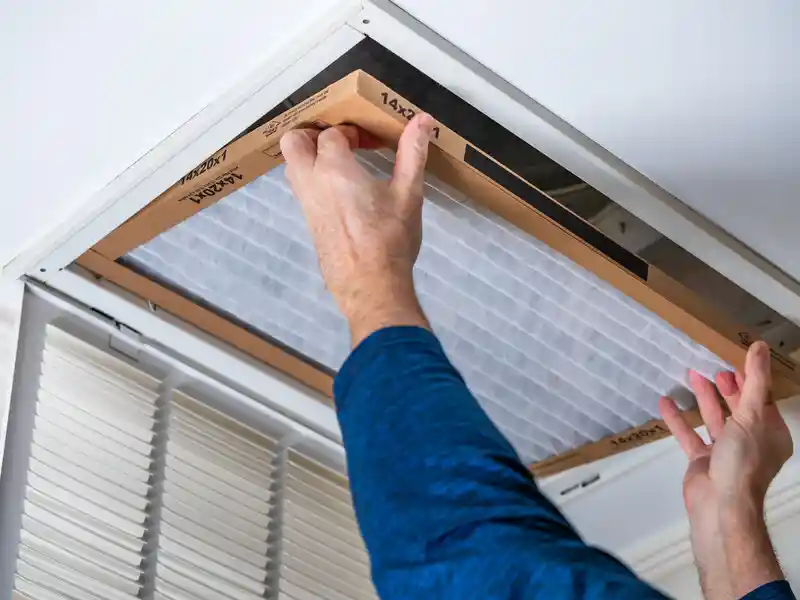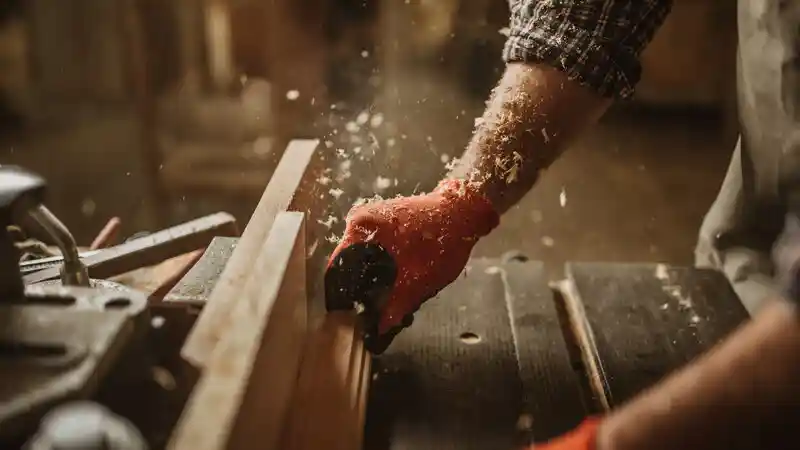An air filter is a valuable addition to any workshop that requires mechanical production and materials that produce sediments or dust. It is a machine with filters made of fibrous or sponge-like materials that remove solid particulates from the air. Usually, these particulate matters include dust, pollen, mold, and bacteria.
Some air filters may contain an adsorbent or catalyst such as charcoal. They can also remove odors and other pollutants, such as volatile organic compounds. In ventilations and engines, the air filter is a valuable device to improve the air quality in a specific indoor environment. In particular settings, air filters use foam, pleated paper, or spun fiberglass to filter. For more high-tech air filters, they use air ionizers with fibers that contain static charges to attract dust particles. Recent improvements to air filters improve aerodynamics and fluid dynamics.
Air Filter vs. Dust Collector
Air quality is essential in any workshop. Good air quality is vital for health, the longevity of equipment, and finished product quality. Poor air quality can cause health issues, damage equipment, and affect product quality. Dust can contain cancer-causing chemicals and irritants. Use air filters or dust collectors.
Poor air quality in a workshop can damage equipment, reduce work accuracy, and affect final product quality. Dust buildup can clog machinery, decrease efficiency and shorten equipment lifespan. Dust on finished products can lower their appearance and value.
Before the development of modern air filters, dust collectors were employed in workshops to purify the air. They can absorb high volumes of dust and other fine particles into a filter, store them in a bag, and allow the user to dispose of them afterward.

Air filters work the same way as dust collectors. However, in terms of effectiveness in filtering the air quality, air filters can provide a better deal as they attract not only dust and fine particles but also volatile organic compounds and bacteria. The high-efficiency particulate air or HEPA filters activated carbon, and UV light for some advanced machines, such as air filters made by Carrier can provide better air quality for the indoor environment. This makes the air filter more practical and a better addition to your workshop.
If you own a workshop that produces wood materials, a good air filter could be the best addition to it. Here are six reasons to help you consider getting an air filter:
- It Prevents Wood Dust From Affecting Your Health
Blogs and websites about woodworking can tell you that wood dust is a common byproduct of cutting or polishing. This wood dust may affect your health and the health of other people in the shop, as exposure to large amounts of wood dust may harm and irritate your eyes, nose, and throat. Conjunctivitis is an inflammation of the eyes due to foreign particles—such as wood dust. Dryness and sore throat may also be familiar, as inhaling these fine wood particles may cause the wood dust to settle in the respiratory tract. Rhinitis or runny nose caused by fine dust may frequently happen as well. And for others, constant skin exposure to wood dust may cause dermatitis due to the chemicals in the wood.
- It Helps In Preventing VOC Inhalation
Volatile organic compounds, or VOCs, are usually artificial compounds constantly released into the air over time. They may come from different products present in a wood workshop, such as varnishes, stains, and glues. These VOCs can produce short-term and long-term health issues inside the human body. The most common compounds are acetone, ethanol, and formaldehyde; over time, they can affect your internal organs and cause extensive complications in the human body. VOC levels are higher in indoor spaces, so an air filter is the best solution to filter these out and keep your working environment safe.

- It Limits Dust From Destroying Electronic Components
One of the largest culprits in the failure of tools, especially the electrical ones, is the dust that settles in the parts and, over time, interferes with the function inside, creating trouble with the tools after. These dust are particles that usually float in the air or are dismissed as some dust on surfaces; they can generally stick to the deepest parts of a device’s gear. These can make your tools unusable once this dust causes enough damage or takes up too much space inside the machine, ruin blades and equipment, and mess up the engine’s oil.
- It Keeps Sawdust From Settling And Collecting Moisture
Sawdust, the byproduct of cutting wood, has high porosity or can absorb moisture and retain it well. The problem starts when the accumulated sawdust inside your equipment absorbs moisture and causes your tools, usually metals, to rust. An air filter can vacuum this fine sawdust into a bag you can dispose of later on. Once your materials have rusted, they typically need to be cleaned, repaired, or replaced—all that could have been avoided if you had an air filter to absorb the sawdust in the first place.
- It Prevents The Particles From Disrupting The Varnishing Or Painting Processes
After your craft or wood project is done, varnish and paint are usually applied to it for different practical or aesthetic purposes. Dust and other particles, however, can interfere with this process and may cause the applied chemical to not stick properly to the surface of the wood. An air filter can help filter out these particles and make your varnishing and painting more manageable and hassle-free.
- It Lessens The Cleaning Time
Less time cleaning your workshop can allow you to do more things, thus increasing overall productivity. Having an air filter can cut the time you need to clean dust and particles present in your wood workshop and therefore is a practical addition to your place. At the same time, you can cut costs and wait time for replacing your tools if dust will not accumulate and cause damage to these machines in the first place.
What is an air filter?
An air filter is designed to remove impurities from the air, such as dust, debris, and other particulates. Air filters typically use a combination of mechanical and electrical processes to trap particles in the air as they pass through the filter.
There are several different types of air filters available, including:
- Mechanical air filters use a physical barrier to trap particles, such as a pleated filter made of paper or cotton.
- Electrostatic air filters use an electrical charge to attract and trap particles in the air.
- HEPA filters, High-Efficiency Particulate Air filters, use a mechanical filtration process to trap particles as small as 0.3 microns at a high-efficiency rate.
Using an air filter in a woodworking or any other workshop has several advantages, including:
- Improved air quality by removing dust, debris, and other particulates from the air, which can help to reduce the risk of respiratory problems, allergies, and eye and skin irritation for workers.
- Reduced fire risk by removing sawdust, wood chips, and other flammable materials from the air, which can help lower the risk of combustion.
- Protection of equipment by removing particulates that can cause damage and affect the longevity of equipment in the workshop.
- Improved work accuracy by keeping the work area and tools clean allows for greater precision.
- Protection of the final product by reducing the chance of dust on the surface of the final product, which can affect appearance and value.
What is a dust collector?
A dust collector is a device designed to capture and collect dust and debris generated during industrial or workshop activities such as woodworking, metalworking, sanding, and more. Dust collectors work by drawing in the dust-laden air and filtering it through one or more filters to capture the dust and debris, which is then collected and disposed of.
There are two main types of dust collectors:
- Single-stage dust collectors typically use a single filter to capture the dust and debris. They are less efficient and don’t filter as finely as two-stage dust collectors.
- Two-stage dust collectors use a two-stage filtration process: a primary filter to capture the larger particles and a secondary filter to capture the finer particles. This allows for higher efficiency in collecting smaller particles.
Using a dust collector in a woodworking or any other workshop has several advantages, including:
- Improved air quality by removing dust and debris from the air, which can help to reduce the risk of respiratory problems, allergies, and eye and skin irritation for workers.
- Increased safety by removing sawdust, wood chips, and other flammable materials from the air can help lower the risk of fire and explosion.
- Protecting equipment by reducing the amount of dust and debris that can clog and damage machinery can help extend the equipment’s lifespan.
- Increased efficiency by capturing dust at the source, which can increase the speed of the process and improve the final product.
- Greater compliance with environmental regulations allows for the proper disposal of dust generated by the processes and keeps the workshop in compliance with local regulations.
Comparison of air filters and dust collectors
Air filters and dust collectors are both designed to remove dust and particles from the air in a workshop, but they differ in their methods of operation and effectiveness.
Air filters typically use mechanical or electrostatic methods to trap and filter particles from the air as it flows through the filter. They can be highly effective at removing particulates from the air, and are often used as a final stage filtration to improve air quality. However, they are less efficient at capturing larger particles, such as wood chips, and can become clogged quickly, requiring frequent maintenance and replacement of filters. They tend to be more cost-effective for small workshops with a low-medium level of dust production.
Dust collectors, on the other hand, use a two-stage filtration process to capture both large and fine particles from the air. They can be highly effective at capturing large volumes of dust and debris, and are often used as the primary means of dust collection in larger workshops. However, they can be more expensive to purchase and maintain than air filters, and are generally more efficient at capturing large particles than small particles.
In terms of scenarios and requirements, air filters are more suitable for small workshops where the level of dust production is low to medium and air quality is the main concern. They are also ideal in situations where cost is a concern and space is limited. On the other hand, dust collectors are more suitable for larger workshops where the level of dust production is high and safety is a major concern. They are also better in situations where compliance with environmental regulations is important.
Ultimately, the best option for a specific workshop will depend on the specific needs, including dust production level, space and budget constraints and the priority of safety or air quality.
Conclusion
Air filters are technological advancements that you can install in your wood workshop. This machine can provide numerous benefits to your health, tools, and craft if you consider getting one for your wood workshop. Remember to consider the size of the indoor shop, the quality and type of filter and features you need, as well as the proper positioning to ensure that the air filter can be utilized well.
- 6 Tips To Craft The Perfect DIY Woodworking Project - August 1, 2022
- Six Reasons You Need an Air Filter In Your Wood Workshop - August 1, 2022
- American made wood lathes - May 26, 2022